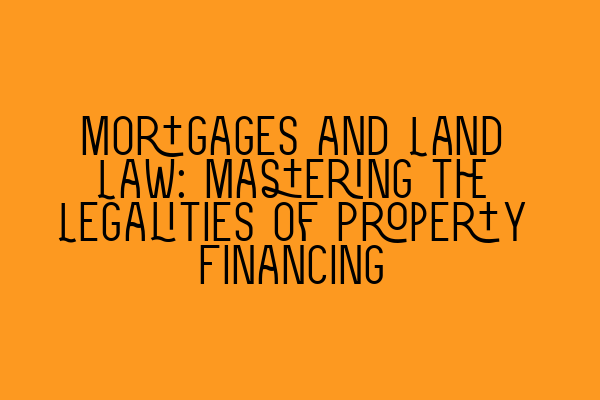Mortgages and Land Law: Mastering the Legalities of Property Financing
Welcome to the SQE Property Law & Land Law blog! In today’s post, we will delve into the intricate world of mortgages and land law. Whether you are a solicitor, law student, or someone interested in property financing, this article will provide you with valuable insights into the legalities involved in this area of law.
Understanding Mortgages
A mortgage is a legal agreement between a lender and a borrower, typically used to finance the purchase of property. It is crucial to comprehend the different types of mortgages and their implications. From fixed-rate mortgages to adjustable-rate mortgages, each comes with its own set of advantages and disadvantages. As a solicitor or aspiring property lawyer, having a comprehensive understanding of these nuances is vital in providing expert advice to clients.
One key aspect of mortgages is the concept of security. The lender typically takes a security interest in the property being financed. This security interest allows the lender to enforce their rights in the event of default by the borrower. Understanding the legal aspects surrounding security interests is essential in providing effective representation to both lenders and borrowers.
Land Law Considerations
Land law plays a significant role in property financing, as it governs the legal rights and responsibilities associated with land ownership and transactions. As a solicitor or property law expert, being well-versed in land law principles is essential in navigating the complexities of property financing.
One crucial aspect of land law is the concept of land registration. Registering land provides security and certainty of ownership. It is crucial to ensure that the property being financed is correctly registered and that all necessary searches and checks are conducted. This helps to protect the lender’s interests and avoids potential pitfalls in the transaction.
Additionally, understanding the rules surrounding easements, covenants, and restrictions is essential in property financing. These legal concepts can significantly impact the borrower’s ability to use and develop the property. As a solicitor, being able to advise clients on these matters is crucial in ensuring smooth property transactions.
Expertise and the SQE
As an aspiring solicitor, it is essential to obtain expertise in property law and land law to succeed in the SQE (Solicitors Qualifying Examination). The SQE is a new route to qualification as a solicitor in England and Wales, and having a solid understanding of property financing is essential for success in both the SQE1 and SQE2 exams.
At SQE Property Law & Land Law, we offer comprehensive preparation courses for the SQE1 and SQE2 exams. Our courses cover all key topics, including mortgages and land law, to ensure that you have the knowledge and skills necessary to excel in the exams. To further enhance your preparation, we also provide practice exam questions and mock exams to simulate the test-taking experience.
To learn more about the SQE exams, exam dates, and to enroll in our preparation courses, please visit our website: SQE 1 Preparation Courses and SQE 2 Preparation Courses. It is never too early to start your journey to becoming a qualified solicitor!
Thank you for reading our blog post on mortgages and land law. We hope this article has provided you with valuable insights into the legalities involved in property financing. If you have any questions or would like to discuss your specific needs, please do not hesitate to contact our team at SQE Property Law & Land Law. We are here to assist you every step of the way!
Related Articles:
- SQE 1 Practice Exam Questions
- SQE 1 Practice Mocks FLK1 FLK2
- SQE 2 Preparation Courses
- SQE 1 Preparation Courses
- SRA SQE Exam Dates
